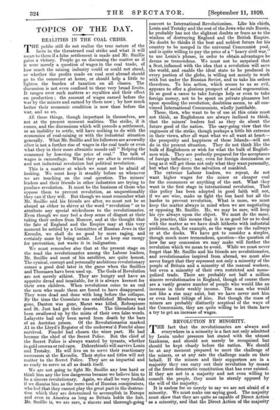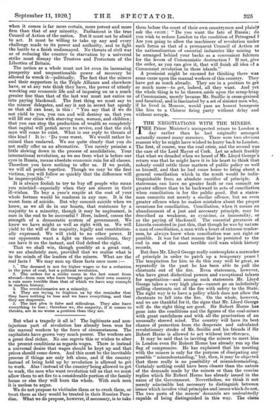REVOLUTION BY MINORITY. T HE fact that the revolutionaries are always
and everywhere in a minority is a fact not only admitted by Lenin under pressure but stated with the utmost frankness, and should not merely be recognized but should be kept clearly before the nation. We should be at any moment prepared to meet the challenge of the miners, or at any rate the challenge made on their behalf. If the miners and their supporters are in a majority they can carry out their revolution by means of the freest democratic constitution that has ever existed. If they are not in a majority and not even willing to consult the people, they must be sternly opposed by the will of the majority.
It is useless for us merely to say we are not afraid of a minority. We must make our saying good. The majority must show that they are quite as capable of Direct Action as a minority, and that the Direct Action of the majority when it comes is far more certain, more potent and more firm than that of any minority. Parliament is the true Council of Action of the nation. But it must not be afraid to act. It must be willing to take up any and every challenge made to its power and authority, and to fight the battle to a finish undismayed. No threats of civil war or of reducing the country to starvation by a universal strike must dismay the Trustees and Protectors of the Liberties of Britain.
The nation as a whole must not let even its increasing prosperity and unquestionable power of recovery 'be allowed to wreck it—politically. The fact that the miners and their supporters in the Triple Alliance and elsewhere have, or at any rate think they have, the power of utterly wrecking our economic life and of imposing on us a much greater fine than that of the last war must not entice us into paying blackmail. The first thing we must say to the miners' delegates, and say it not in secret but openly so that all can hear, is this : " You say that if we do not yield to you, you can and will destroy us, that you will fill our cities with starving men, women, and children; that you can stop the production of wealth so completely that capital will perish never to revive, and that the rich man will cease to exist. What is our reply to threats of this kind ? It is : Do your worst. We would rather be rained than enslaved. We see quite clearly that you do not really offer us an alternative. You merely promise a little slowing down in the process of annihilation. Your international revolution, as we see from what is before our eyes in Russia, means absolute economic ruin for all classes. Therefore you have nothing to offer us. If we perish, we will all perish together. Though we may be the first victims, you will follow so quickly that the difference will be imperceptible.' " It is always foolish to try to buy off people who mean you mischief—especially when they are sincere in their ill-wishes. To buy a year's respite at the cost of your whole fortune would be madness in any case. It is the worst form of suicide. But why commit suicide when we know, as we all do in our hearts, that resistance by a majority to a minority, though it may be unpleasant, is sure in the end to be successful ? Here, indeed, comes the strength of a democratic system of government. We know we have might as well as right with us. We will yield to the will of the majority, legally and constitution- ally expressed. We will yield to no other power. If our opponents want a fight on these conditions, they can have it on the instant, and God defend the right.
That we shall win, though possibly at a great cost, we are absolutely sure, provided that we realize what is in the minds of the leaders of the miners. What are the real facts ? We may sum up these facts once more :- l. The demand is not for higher wages or for a reduction in the price of coal, but a political revolution.
2. The orders for a strike come in the last resort from abroad—from men who have brought upon their own country a ruin more terrible than that of which we havo any example in modern history.
3. The revolutionaries are a minority.
4. They are trying to frighten us by the reminder that they have nothing to lose and we have everything, and that they are desperate.
5. The last plea is false and ridiculous. They also have everything to lose ; therefore we, the majority, if it comes to threats, are in no worse a position than they are.
But what a tragedy it all is ! The legitimate and non- injurious part of revolution has already been won for the manual workers by the force of circumstances. The capitalists have grown very much poorer. The workers are a great deal richer. No one regrets this or wishes to alter the present conditions as regards wages. There is instead a universal desire that wages should be kept up and that prices should come down. And this must be the inevitable process if things are only left alone, and if the country instead of being held up by revolution is allowed to get to work. Alas !instead of the country being allowed to get to work, the men who want revolution tell us that we must allow them to set fire to a considerable portion of the family house or else they will burn the whole. With such men it is useless to argue. We do not propose to victimize them or to crush them, or treat them as they would be treated in their Russian Para- dise. What we do propose, however, if necessary, is to take them before the court of their own countrymen and plainly ask the court : " Do you want the fate of Russia; do you wish to reduce London to the condition of Petrograd ? Are you going to allow the machinery of revolution under such forms as that of a permanent Council of Action or the nationalization of essential industries like mining to be arranged behind your backs as a convenient fulcrum for the levers of Communistic destruction ? If not, give the order, as you can give it, that will finish all idea of a Communist revolution in these islands."
A pessimist might be excused for thinking there was some curse upon the manual workers of this country. They have got so much already. They are in a position to get so much more—to get, indeed, all they want. And yet the whole thing is to be thrown aside upon the scrap-heap of Communism, merely because Mr. Smillie is cross-grained and fanatical, and is fascinated by a set of sinister men who, if he lived in Moscow, would pass an honest bourgeois like him to a Chinese firing party without delay and without scruple.



































 Previous page
Previous page